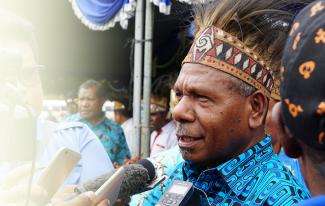To accelerate the recognition of indigenous territory, in September 2018, the Jayapura regency government issued a District law for the recognition, protection and empowerment of indigenous peoples, establishing a special task force called the Indigenous Peoples Task Force (GTMA). The task force focuses on preparing social and spatial data, providing capacity building to institutions related to the recognition and protection of indigenous peoples' rights to natural resources, and policy analysis which strengthens the implementation of this program.
Since the region received its special autonomy status in 2001, the Papua provincial government has passed regulations that recognise the existence of indigenous communities. Implementation of the provincial regulation depends on action from the districts, however, and most have not taken any action. Jayapura District is an important exception – it is one of the few districts that has developed its own regulations for recognition and protection of the rights of customary villages and indigenous peoples, as outlined in Jayapura District Regional Regulation No. 8 of 2016. The vision of the current District Head of Jayapura is to implement Indigenous Peoples’ tenure rights through District implementing regulations, based on existing laws, such that it is acknowledged by the state.
Samdhana was approached to facilitate processes to ensure that the development process is driven by local community needs, instead of the usual ‘top down’ approach. In collaboration with its national and local network of partners and supported by multiple donors, Samdhana facilitates training to raise awareness and skills, advocates for policy change to support the initiative, and suports mapping and documentation of indigenous rights. Local, national and international exposures in events such as COP 23 or Climate Summits have helped to promote the importance of the issue and raise futher support.
The GTMA has produced a Jayapura District Roadmap document for Indigenous Peoples Recognition, Protection and Empowerment that contains analysis of laws and policies related to the recognition and protection of indigenous peoples and their customary rights. One of their key targets is the 28 villages of the Bhuyaka tribe. By the end of 2020, 30% of the tribes territory had been mapped. Political and policy support to the GTMA from the local government is given through its legal establishment, through the annual district budget allocation (Anggaran Pendapatan dan Belanja Daerah, APBD) and the Village Special Fund (Anggaran Dana Kampung, ADK).
The lessons learned by Samdhana from playing a supporting role for GTMA are, firstly, that support from the local government is vital, especially through policies and budget allocation. The Head of the District embedded GTMA in the local government structure and budget system.
Secondly, the willingness of the district government to work with multiple actors. Mapping requires considerable human and financial as well as time as the issues are complex, takes a lot of time and energy. With total area covering 139 villages and a large number of tribes, limited capacity and limited funding, it will require time to finalise intervention for whole of Jayapura District. For those that has been mapped, although it is not a huge coverage, the local government has seen its benefits, as it has helped them to plan for education, economic development and conservation.
In addition, ensuring that the process is bottom up is proven to be yet another challenge as the capacity is not there. With more than 22 sub-tribes and traditions in Jayapura District it is a challenge to accommodate gender and marginalised groups in the facilitation processes. The whole intervention needs to have a process that enables marginalised and women’s group to participate in the processes.
GTMA is ad hoc and political in nature. To be replicated in other locations, the lessons learned above are very important. Support from the outsiders will not be meaningful if the initiative is not rooted and supported by local actors.




